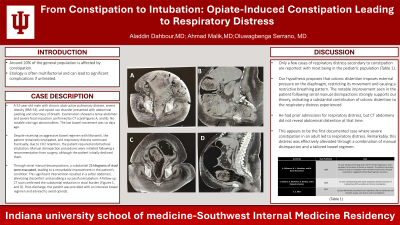Monday Poster Session
Category: Esophagus
P2259 - Pantoprazole-Induced Hypomagnesemia: A GERD Management Dilemma
Monday, October 28, 2024
10:30 AM - 4:00 PM ET
Location: Exhibit Hall E

Has Audio
- AD
Aladdin Dahbour, MD
Indiana University
Evansville, IN
Presenting Author(s)
1Aladdin Dahbour1, MD, Kyle Hagen, DO, Oluwagbenga Serrano, MD, FACG2
1Indiana University, Evansville, IN; 2Good Samaritan Hospital, Vincennes, IN
Introduction: Proton pump inhibitors are commonly prescribed for the management of gastroesophageal reflux disease. While generally well-tolerated, long-term use of PPI has been associated with various adverse effects, including hypomagnesemia. Hypomagnesemia can be life threatening if not promptly recognized and managed. We present a case of a 61-year-old male patient who developed severe hypomagnesemia mostly attributed to pantoprazole use emphasizing the importance of vigilance in patients requiring long-term PPI therapy.
Case Description/Methods: A 61-year-old male with severe gastroesophageal reflux disease (GERD), hypertension, and peripheral artery disease presented with recurrent symptomatic hypomagnesemia (Mg < 0.7 mg/dL) and EKG changes. Symptoms included tremors, muscle spasms, numbness, and fatigue. Discontinuation of pantoprazole for 3-4 months normalized magnesium levels and resolved symptoms, indicating a strong correlation between pantoprazole use and hypomagnesemia. Alternative antacids were ineffective and poorly tolerated, leading to patient resumption of PPI therapy. Other causes of hypomagnesemia were ruled out, and urine studies, including magnesium levels, were normal despite mild hypocalcemia. The patient, unsuitable for surgery and unwilling to discontinue PPIs, continues pantoprazole with regular magnesium monitoring and oral replacement therapy.
Discussion: PPIs are known to cause impaired magnesium absorption in the intestines primarily by reducing the solubility of magnesium in the intestinal lumen and altering transport protein activity. This can lead to hypomagnesemia, which may manifest with symptoms such as nausea muscle cramps, and EKG abnormalities and in severe cases, seizure and cardiac arrhythmias.
The prevalence of hypomagnesemia among PPIs users is notably higher, with studies indicating a 21.9% prevalence in hospitalized older patients on PPI compared to 15.8% in non-users.In some cases, hypomagnesemia can be refractory to magnesium replacement but generally improves upon discontinuation of the PPI.
Clinicians should monitor magnesium levels for patients on long-term PPI therapy and consider alternative treatments if hypomagnesemia occurs.This case highlights the importance of awareness and proactive management of hypomagnesemia in patient prescribed PPIs particularly those at higher risk or on concurrent medication therapies
Disclosures:
1Aladdin Dahbour1, MD, Kyle Hagen, DO, Oluwagbenga Serrano, MD, FACG2. P2259 - Pantoprazole-Induced Hypomagnesemia: A GERD Management Dilemma, ACG 2024 Annual Scientific Meeting Abstracts. Philadelphia, PA: American College of Gastroenterology.
1Indiana University, Evansville, IN; 2Good Samaritan Hospital, Vincennes, IN
Introduction: Proton pump inhibitors are commonly prescribed for the management of gastroesophageal reflux disease. While generally well-tolerated, long-term use of PPI has been associated with various adverse effects, including hypomagnesemia. Hypomagnesemia can be life threatening if not promptly recognized and managed. We present a case of a 61-year-old male patient who developed severe hypomagnesemia mostly attributed to pantoprazole use emphasizing the importance of vigilance in patients requiring long-term PPI therapy.
Case Description/Methods: A 61-year-old male with severe gastroesophageal reflux disease (GERD), hypertension, and peripheral artery disease presented with recurrent symptomatic hypomagnesemia (Mg < 0.7 mg/dL) and EKG changes. Symptoms included tremors, muscle spasms, numbness, and fatigue. Discontinuation of pantoprazole for 3-4 months normalized magnesium levels and resolved symptoms, indicating a strong correlation between pantoprazole use and hypomagnesemia. Alternative antacids were ineffective and poorly tolerated, leading to patient resumption of PPI therapy. Other causes of hypomagnesemia were ruled out, and urine studies, including magnesium levels, were normal despite mild hypocalcemia. The patient, unsuitable for surgery and unwilling to discontinue PPIs, continues pantoprazole with regular magnesium monitoring and oral replacement therapy.
Discussion: PPIs are known to cause impaired magnesium absorption in the intestines primarily by reducing the solubility of magnesium in the intestinal lumen and altering transport protein activity. This can lead to hypomagnesemia, which may manifest with symptoms such as nausea muscle cramps, and EKG abnormalities and in severe cases, seizure and cardiac arrhythmias.
The prevalence of hypomagnesemia among PPIs users is notably higher, with studies indicating a 21.9% prevalence in hospitalized older patients on PPI compared to 15.8% in non-users.In some cases, hypomagnesemia can be refractory to magnesium replacement but generally improves upon discontinuation of the PPI.
Clinicians should monitor magnesium levels for patients on long-term PPI therapy and consider alternative treatments if hypomagnesemia occurs.This case highlights the importance of awareness and proactive management of hypomagnesemia in patient prescribed PPIs particularly those at higher risk or on concurrent medication therapies
Disclosures:
Aladdin Dahbour indicated no relevant financial relationships.
Kyle Hagen indicated no relevant financial relationships.
Oluwagbenga Serrano: MERCK – Stock-publicly held company(excluding mutual/index funds).
1Aladdin Dahbour1, MD, Kyle Hagen, DO, Oluwagbenga Serrano, MD, FACG2. P2259 - Pantoprazole-Induced Hypomagnesemia: A GERD Management Dilemma, ACG 2024 Annual Scientific Meeting Abstracts. Philadelphia, PA: American College of Gastroenterology.
